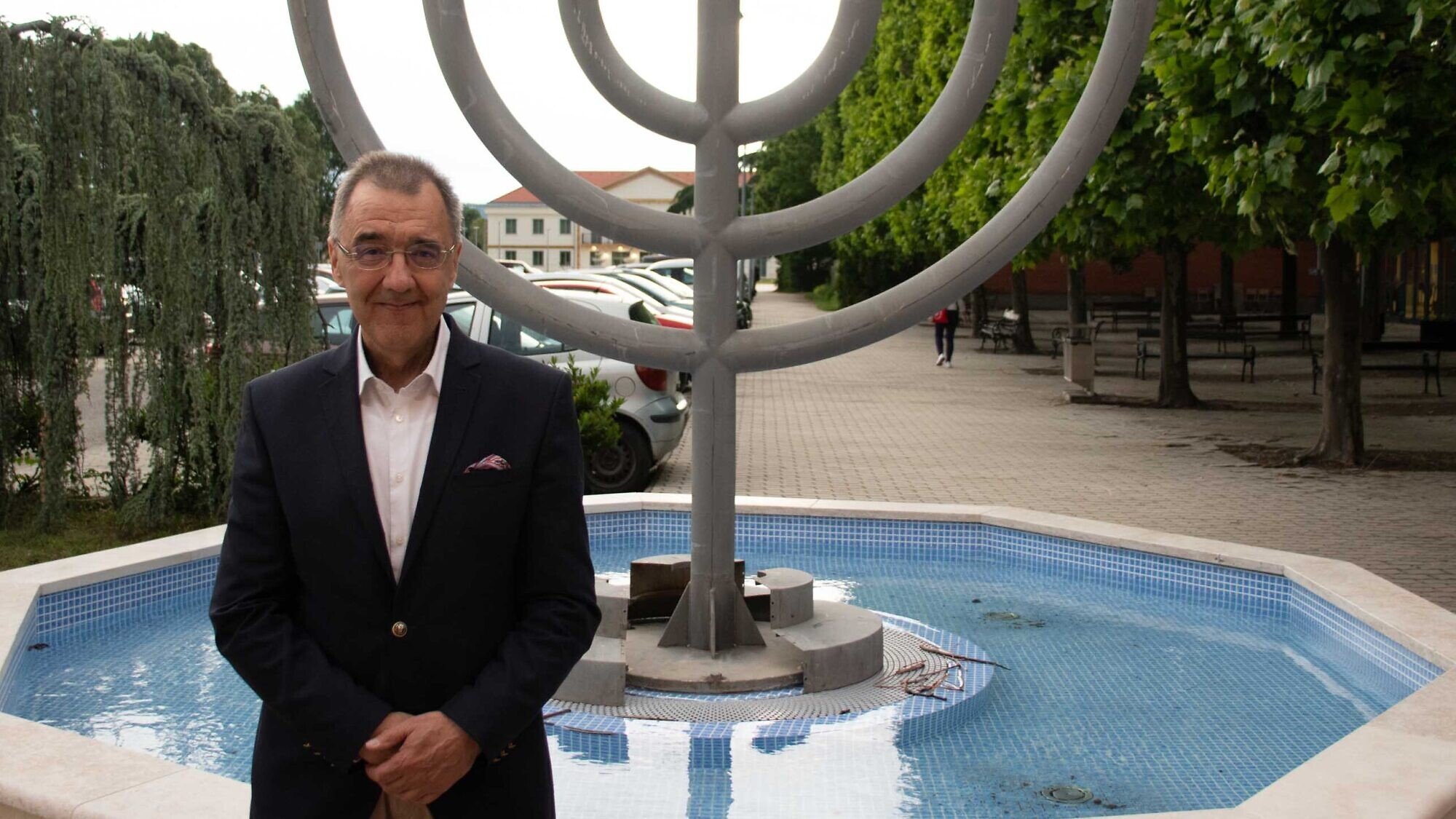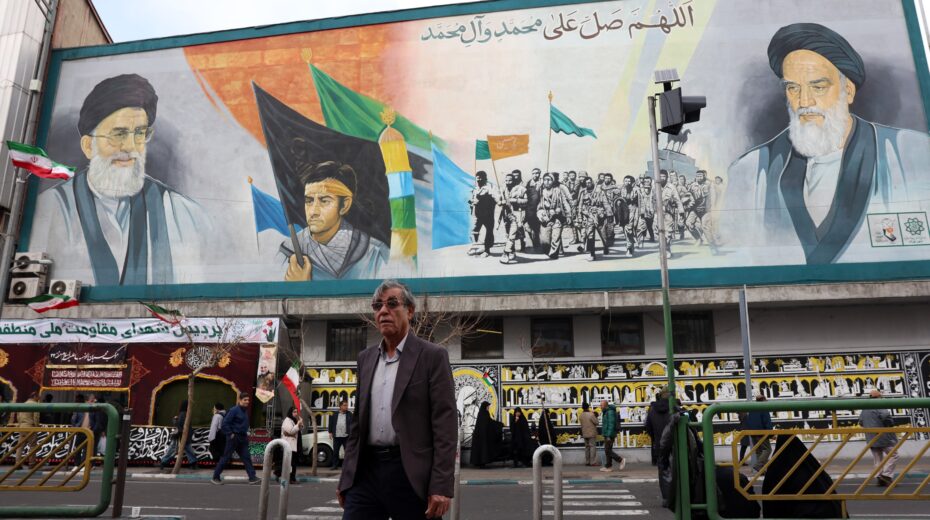(JNS) Israel has long relied on the steadfast backing of American Evangelicals, a cornerstone of its support base in the United States. Yet as elements of US President Donald Trump’s coalition—most notably commentator Tucker Carlson—take explicit aim at that support, it is encouraging to find a core of Evangelical support for Israel in a generally unfriendly Europe.
Hungary’s Faith Church is the largest Evangelical church in Europe. It has played a leading role in shaping pro-Israel sympathies among the Hungarian public.
Founded in 1979 by Pastor Sándor Németh, it began as an underground congregation monitored by the communist regime. Despite efforts to suppress the church, its membership grew to 2,000 by 1989.
Today, it numbers more than 70,000 members with 300 branches across Hungary and beyond and is recognized as an official denomination by the state.
Faith Church’s unwavering pro-Israel stance is rooted in biblical belief. It sees the restoration of the Jewish commonwealth as the realization of divine prophecy.
Its philosemitic conservatism reaches an audience far beyond its church-going public through its media platforms, which include television (Faith Church is the second-largest broadcaster in the country), radio and a weekly periodical. It also organizes pilgrimage trips with about 400 congregants visiting Israel each year.
JNS spoke with István László Mészáros, Faith Church’s executive director, about the church’s history and pro-Israel support.
Q: How did Faith Church start? What were the milestones in its development?
A: Faith Church, our church, grew out of a prayer group. It was composed of Sándor Németh, our lead pastor, his wife, Judith, and a few of their friends. It was a group of 40 people. We held our church services in a little house on the outskirts of Budapest.
We were independent. All the other churches were under the control of the communist regime. The communists covered all areas of life, including church activity. To speak honestly about the Bible, about what was actually written in it, was a very dangerous thing to do at that time.
Sándor Németh came from a Roman Catholic background. He didn’t plan on starting a new church or new denomination. He wanted to talk about the Bible honestly, to pray without any censorship, and to create a community of like-minded people.
Pastor Sándor wanted to go back to the roots as it was in the Apostolic times—to take the word of God seriously.
I joined in 1981. One of my friends repented. He had his hair cut, stopped drinking. I couldn’t understand what happened to him. It was such a great change. He explained to me that he accepted Jesus Christ and that changed his whole life. He took me to these people. I heard this really clear, honest preaching, And I accepted Jesus also. And I’ve been a member of the church ever since.
Q: How risky was it to belong to the church back then?
A: The church was an illegal group. We were unlicensed. It was a crime under the communist penal code to take part in the activity of any organization which didn’t have a license. Until 1989, we were an illegal group.
I was a second-year student at the Faculty of Law here in Budapest [Eötvös Loránd University]. When I joined the church, I could have been kicked out of the university anytime. There were some who were kicked out of their workplaces. Sandor’s wife, Judith, was forced out of her teaching position at a grammar school.
The newspapers were in the hands of communists. They started a campaign against us. They published thousands of articles full of lies to discourage people from having anything to do with us. We were accused of being CIA agents, for instance. They said Pastor Németh received $1,000 from the CIA for every person who repented. It was just ridiculous.
We didn’t have any chance to defend ourselves because we didn’t have a platform. That continued until the fall of communism. That’s why our pastor founded a newspaper. It was the first platform to tell about ourselves, but also to write articles about Israel and other topics where we thought differently than the rest of society.
Q: How is that your church grew despite the opposition of the communist authorities?
A: Word got out to anyone dissatisfied with Christianity controlled by the communists. It wasn’t just people from the Roman Catholic Church. The Calvinists and other denominations came because they lacked something that they were looking for, which was the Bible.
Q: What is the source of your pro-Israel support?
A: It’s very important to note that the church, since its very beginning, believed in the whole Bible. We accepted both the Old Testament and the New Testament.
Jews, the Abrahamic faith, Moses and all—these are the roots. We are just branches. And that’s why there is a spiritual brotherhood between Jews and Christians. We strongly believe in that brotherhood. We find it very sad that there was a long period in church history where there was animosity between the two. We believe that the two belong together.
The first apostles were all Jewish and Jesus Christ came from Davidian roots.
There is one main difference. We believe that the Messiah has already come. We believe that Jesus Christ is the Messiah.
Q: Has your church influenced conservatism in Hungary?
A: We are really happy that in Hungary, patriotism and conservatism appeared in a new form as compared with Hungarian conservatism before the Second World War. [Hungarian conservativism prior to WWII was openly antisemitic]. It would have been quite natural in the 1990s after the collapse of the communist regime for conservatives to swing back to the old nationalist attitudes. There was a risk that even after regime change, conservatism would be the same as before. We were happy we could contribute to the fact that Hungarian conservatism is the kind we have now.
We publish Hetek, a weekly magazine, and we have a media network with which we can reach a lot of people, not just intellectuals and politicians, but average people. We have our church services every Sunday on TV, which reaches every household in Hungary. Our pastor doesn’t shy away from talking about current topics during the church service.
People have been listening for decades, even those who aren’t members of the church. Politicians listen. We know the prime minister [Viktor Orbán] is listening. And they are influenced by it. Their way of thinking changes. We’ve introduced many ideas that weren’t there before.
Q: There have been no mass pro-Hamas demonstrations in Hungary. Did you have a role in that?
A: It was one of our journalists who spotted the first few attempts after the Oct. 7, 2023, attack. Some international students and the Embassy of Palestine wanted to organize protests. We let the police know that they were planning something for the “Day of Rage.” We explained that it’s not a pro-Palestinian protest, it’s a pro-terrorist protest. And it’s a threat to Hungary. They very quickly understood. A few days later, the government and Prime Minister Viktor Orbán said: “No, we will not allow any intifada-type protest on our streets. Not here.”
Q: Prime Minister Viktor Orbán will retire one day. When he does, will Hungary still support Israel?
A: There is always a concern, but we try to build connections on both sides of the political aisle. We are not a partisan church in the way that some American evangelical churches are. We connect with opposition politicians who have similar values in certain areas with us. We don’t want our influence to disappear when there is a change in government.
Q: Are you optimistic for the future?
A: Israel is restored. It is proof that what God said about the future of the world is true. Your country, after a disappearance of almost 2,000 years, exists again.
As Apostle Paul says in the New Testament, God hasn’t cast away the Jewish people. He gathers the Jewish people. And this is what we are witnessing in our times. We don’t think that the prophecies about Israel, about the gathering of Israel, about the future of Israel, are fairy tales. They are in the Bible.
And as we see the ancient prophecies about Israel take place before our eyes, we can know that other prophecies about the future of humanity will also come true.
Even if someone doesn’t believe in the Bible or biblical prophecies, there are several rational and humanistic reasons to support the restoration of Israel. The desire for righteousness and historical justice makes it natural for all of us to support Israel’s fight and the fight of the Jewish people.
Want more news from Israel?
Click Here to sign up for our FREE daily email updates














